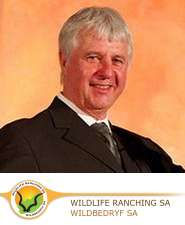ATTACKS ON WILDLIFE RANCHING
- adriaansnyma2
- Mar 6, 2015
- 2 min read
An open letter from WRSA President, Dr Peter Oberem to Minister of Enviromental affairs, Edna Molewa.
Dear Minister Molewa,
RE: ATTACKS ON WILDLIFE RANCHING
I, all my colleagues at WRSA, and I am sure the great majority of game ranchers are deeply disturbed (as I am sure you are) by the unprecedented attack orchestrated by a few individuals with an agenda that I cannot understand. This has culminated in media hype that totally distorts the facts and which is aimed at discrediting wildlife ranching – the pride of true conservationists in South Africa.
Many totally unfounded allegations not based on fact or science are made by these

individuals and the organisations they lead. Most are so nonsensical that they do not require any riposte.
The one area I believe WRSA needs to focus on is providing science and fact on the so-
called ‘inbreeding’ of buffalo as well as sable and colour variants. Some time ago, WRSA recognised the need and devised a programme of scientific research looking into the ‘relatedness’ of animals in and between our wildlife ranching herds, in some instances comparing them with those of herds in the parks. You will appreciate that such scientific research and work takes a long time but I am pleased to say that we will, proactively, have the first report/paper available to provide to you and your staff for evaluation by the end of March 2015.
Part of this first project, at the expense of WRSA, is to use the world’s leading genetic statistician to bring his expertise and experience to SA and to train eight of our local scientists, post-graduate students and technicians in this technique and its interpretations. This training was arranged some time ago for late March 2015. These trained individuals will then be able to take the planned programme further over the next year or two with similar projects on sable antelope, roan and the golden gnu.
The second area of focus for WRSA is the finalisation of a “Code of Best Practice: Wildlife Breeding”. This will be added to our WRSA Constitution and Code of Conduct. In this way, we will be able to take action against defaulters by expelling them from the Association. Of course, if obtaining a permit to be a wildlife rancher were to be conditional on being a member of WRSA, then we would be in a position to really act strongly against any defaulters and, in so doing, rid our industry of any possible defaulters.
Finally – and most definitely not because we accept that the animals in the hands of private game ranchers are in any way inferior – we at WRSA point out that we do not wish to lose any of the animals that are so very valuable to us. Accordingly, we have very secure fencing to keep them confined to our private ranches. Further, we undertake to ensure that none of the animals under discussion reach ‘the wild (in the South African context, the national and provincial parks) without the necessary risk analyses.
I trust, Minister, that WRSA’s proactive research and other actions taken will serve us both well in terms of placing this criticism into perspective.
Yours sincerely
Dr Peter Oberem
President: WRSA






































Comments